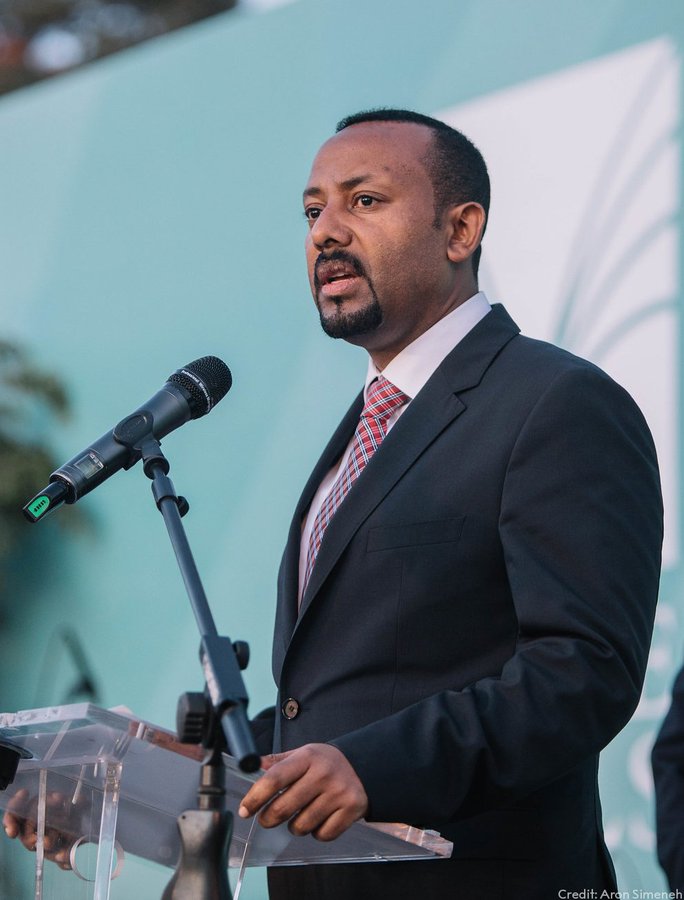The Ethiopian Prime Minister, Abiy Ahmed has won this year’s prestigious Nobel Peace prize after brokering an audacious peace deal with Eritrea.

The Ethiopian leader ended a savage war between the two African nations which raged for two decades after erupting in the late 1990s.
Abiy beat out competition from hundreds of nominees for the 100th Peace Prize, including 16-year-old activist Greta Thunberg and New Zealand’s leader Jacinda Ardern.
The Ethiopian Prime Minister’s office has tweeted out a statement after Abiy Ahmed was named the Peace Prize winner.
It says the office is “pleased to express our pride” in the selection, adding that Abiy “has made peace, forgiveness and reconciliation key policy components of his administration.”
A statement from Berit Reiss-Andersen, the Chair of the Norwegian Nobel Committee, on why the committee gave Abiy this year’s award says: “When Abiy Ahmed became Prime Minister in April 2018, he made it clear that he wished to resume peace talks with Eritrea. In close cooperation with Isaias Afwerki, the President of Eritrea, Abiy Ahmed quickly worked out the principles of a peace agreement to end the long “no peace, no war” stalemate between the two countries.”
Reiss-Andersen also praised Afwerki for working with Abiy to achieve peace: “Peace does not arise from the actions of one party alone. When Prime Minister Abiy reached out his hand, President Afwerki grasped it, and helped to formalise the peace process between the two countries. The Norwegian Nobel Committee hopes the peace agreement will help to bring about positive change for the entire populations of Ethiopia and Eritrea.”
In Ethiopia, even if much work remains, Abiy Ahmed has initiated important reforms that give many citizens hope for a better life and a brighter future. He spent his first 100 days as Prime Minister lifting the country’s state of emergency, granting amnesty to thousands of political prisoners, discontinuing media censorship, legalising outlawed opposition groups, dismissing military and civilian leaders who were suspected of corruption, and significantly increasing the influence of women in Ethiopian political and community life. He has also pledged to strengthen democracy by holding free and fair elections.
But she accepted that several challenges remain in bringing peace and security to the country:
Ethiopia is a country of many different languages and peoples. Lately, old ethnic rivalries have flared up. According to international observers, up to three million Ethiopians may be internally displaced. That is in addition to the million or so refugees and asylum seekers from neighbouring countries. As Prime Minister, Abiy Ahmed has sought to promote reconciliation, solidarity and social justice. However, many challenges remain unresolved. Ethnic strife continues to escalate, and we have seen troubling examples of this in recent weeks and months.
Berit Reiss-Andersen, the Chair of the Norwegian Nobel Committee, was asked by a journalist whether she had a message to disappointed supporters of Greta Thunberg, the bookmakers’ favorite to win the prize.
“On the day when we announce the prize we never comment on who didn’t get the prize, and who could have had the prize,” she said, adding that she has “no comment” on the question.
There’s no way of knowing for sure whether Thunberg was even nominated — the names considered are kept secret for decades — but it’s almost certain she was put forward.

Ahmed in his first press conference since taking power in April 2, 2018 vowed to continue with dramatic reforms “at any cost” and said the longtime ruling coalition soon will prepare for a “free and fair election” in 2020. Ahmed also said the World Bank “soon” plans to provide $1 billion in direct budgetary assistance, a sign of confidence after years of unrest in Africa’s second most populous nation. Such assistance stopped after the disputed 2005 elections. “My dream is that doubts about the ballot box will disappear,” Abiy said, saying the vote won’t be delayed and promising a peaceful transfer of power if he loses.
The 42-year-old Abiy took office in April and shocked the country with a wave of reforms including restoring diplomatic ties with neighboring Eritrea after two decades, pledging to open up state-owned companies to outside investment and releasing thousands of prisoners.
The reforms have been praised by the international community and attracted investors interested in one of Africa’s fastest-growing economies. Recent ethnic unrest in various parts of Ethiopia, however, has dampened the initial jubilation and posed a major challenge to the new leader. “There are groups that are working in unison to cause chaos in different parts of the country,” Abiy told reporters.
“They are triggering peoples’ emotions to this end.” Some 2.8 million people have been displaced by the unrest, according to the United Nations. “But this didn’t happen due to the reforms,” the prime minister said. He said the unrest in the eastern Somali region has calmed but measures will be taken against former officials, including the region’s former President Abdi Mohammed Omar, who is suspected of orchestrating the chaos earlier this month that led to the destruction of government offices, looting of businesses and burning of churches. Asked about internet cuts in the region following the unrest,












